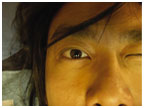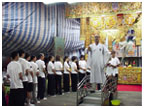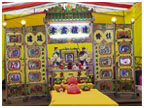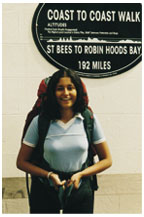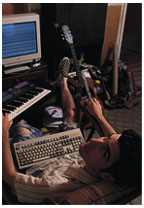November 6, 2002: Features


Dale award winners take time to explore before tackling “real life”
By Argelio R. Dumenigo
“The academy is not paradise. But learning is a place where paradise
can be created.”
— Bell Hooks, U.S. author and educator
|
Tim Allen ’04 explored the culture and art of the San people of southern Africa, thanks to a Martin A. Dale ’53 award. Facing page, an example of San rock art.
Above: Self-portrait of Tze Wei Ng ’04 who traveled to Singapore to film a documentary on his family and homeland; a priest at an outdoor ceremony; a ceremonial funeral wall for Ng’s great-aunt. Ananya Lodaya ’04 enjoys the end of her hiking trip across England, where she spent 22 days trekking over the dales and moors she knew from English literature. Daniel Iglesia ’04 in his parents’ garage this summer, where he composed a 70-minute opera he hopes to produce at Princeton. (Photo by David Toerge/black star) |
The dirt roads, semi-arid plains, and plateaus that reach up into the endless skies served as Timothy Allen ’04’s classroom this summer as he traveled throughout southern Africa to learn about the San, the native people of the region. At times, he traveled on buses that carried more goats and chickens than people. Other times, Allen and a travel mate caught rides from strangers as they crisscrossed the sandy veld.
Making their way through the town of Tsumeb in northeastern Namibia one day, the pair caught a ride to a rest camp made up of stick-and-thatch huts and a solar water pump operated by some of the San, about 50,000 of whom now live in Africa. It was a Saturday, the only day of the week when the entire community gathered around a campfire to sing and dance. “The music was mesmerizing, consisting of a drumbeat and clapping, either of two hands or of two wooden bricks. . . . Each person sang the same tune and words, but all in different keys and with different timing, creating a multilayered effect that was striking,” Allen, a student in the Woodrow Wilson School, e-mailed friends.
The next morning, two of the San men took Allen, who was born and raised in South Africa, on a bush walk that opened his eyes to their world. One man picked up a snail shell and explained how to grind it into a pulp, add water, and use it to treat toothache. Another told him how they used trees to solve village thefts by taking a branch from one tree and placing it among the branches of another. Within a few days, the branches would mystically reveal the name of the thief, who would then confess and return the property.
As Allen tramped across the land and walked past trees and plants he would have ignored before, the land took on a whole new life. “In the course of my travels, I saw many strange and beautiful things,” he wrote after his return. “The drunk, dancing cowboys in the bar in Francistown. The Makgadikgadi salt pans of central Botswana. The sun floating on the heavy liquid of the Okavango Delta. The sleepy village of huts somewhere in Botswana, whose inhabitants were watching the first movie they had ever seen.”
“They have a very interesting way of looking at the world,” he says of the San. And soon, he shared in it. “Their perceptions of life and the world around them were so different from my own, and it awakened in me a deep appreciation for the grace and elegance of the tempestuous veld of southern Africa,” he said after he was home.
Allen’s experience — a three-month journey to understand the San, their art, and their spirituality — came courtesy of the Martin A. Dale ’53 Summer Awards Program. Dale died last year, yet he continues to give Princeton undergraduates the experience of a lifetime. Since the program’s inception 11 years ago, 109 students entering their junior year each have received $3,000 to pursue summer projects they conceived and developed. Turning their minds’ eyes into scholarly guides, the winners have undertaken everything from community service projects in Trenton, West Virginia, and India, to overland journeys from London to Japan, to the study of Bulgarian folk costumes in Paris. Through Dale’s gift, Princeton students have mastered traditional quilting, produced gospel recordings, and worked with children around the world. Allen was among 10 award winners this past summer.
Dale created the summer program to allow students to test a talent or idea beyond what they were studying at Princeton. “Very often circumstances force young people to make decisions about their lives and work without the opportunity to reflect adequately upon their interests or to explore latent talents,” Dale said in 1996. The grants, he explained, were meant to give students a chance to find those interests and explore them.
The program “provides students with wonderful opportunities to develop summer projects that they have imagined and designed, projects that permit the exploration of personal interests and the testing of special talents in what are often life-changing ways,” says Princeton’s Dean of the College Nancy Malkiel, who worked with Dale for more than a year to develop the program in 1991. In 1997, he also endowed a $25,000 annual fellowship that goes to a graduating senior to fund a yearlong independent project.
Grant Wahl ’96, a previous summer winner, had never been outside the U.S. when his project took him to Argentina’s soccer stadiums and Boston’s Fenway Park in 1994 to write a piece on the fervor fans in both countries have for their national pastimes. He was embraced by the hard-core fans of the soccer team, Boca Junior, a group rumored to be violent — even murderous — in their dedication to the sport. Wahl joined them on a bus trip, singing their songs and drinking their beer, and found the rumors to be exaggerated.
Now, the one-time politics major is a staff writer at Sports Illustrated and gives his Dale experience the credit. “I have a hard time thinking I’d be doing what I’m doing now if it was not for that summer,” says Wahl, who, like the others who won the award before Dale’s death, got to meet his patron at an annual dinner in honor of the students.
“He was curious about all of the projects, and he cared. You could tell he was excited about what his money was going toward,” Wahl remembers. “You could tell he and the university wanted off-beat ideas about things that required thought and imagination. It’s hard to find awards that really encourage imagination and let you think as big as possible.”
Giving back
Dale’s own education was due to another’s philanthropy. A city boy from Newark, New Jersey, Dale entered Princeton in 1949 on a William H. Cane scholarship, which included money for books and a stipend. Established in 1948, the scholarship was designed to give New Jersey public school students who qualified and demonstrated financial need the opportunity to attend Princeton. Dale went on to get a graduate degree at Tufts University’s Fletcher School of Law and Diplomacy and to serve as a U.S. diplomat in Monaco, where he became a friend and economic adviser to Prince Rainier and rubbed elbows with the likes of tycoon Aristotle Onassis.
“Had it not been for that support, before there was institutionalized financial aid, he would not have been able to attend Princeton,” says Dale’s son Charles ’78. “His gift is a thank-you, and a hope that the recipients will feel called upon to give of themselves in some way.” In a 1999 interview with PAW, Martin Dale called the awards the “major accomplishment of his life.”
“Nothing touches me as truly significant other than the influence, small as it may be, I will have had on so many young people,” he said then. “I just do my little pollinating and know that the flowers are blooming.” This summer, as usual, those flowers were blooming all over the world.
Tze Wei Ng ’04, who is majoring in economics, returned to his family in Singapore to film a documentary entitled Homecoming, interviewing relatives and collecting 21 hours of footage of his family, the streets, and his great-aunt’s funeral. Willow Sainsbury ’04, an art history major, hunkered down in eight museums across England to catalog artifacts of her native New Zealand’s Maori people in the museums’ collections; she became obsessed with the story of a Maori woman, Makereti Papukura, who collected photographs, scrapbooks, letters, and other documents that opened a window into the lives of her people. Math major Alexandra Gliga ’04 traveled with a digital camera from her father’s home in Bucharest to make a documentary on the life of Gypsies in her homeland, Romania. Her timing was perfect: Although most of Romania’s Gypsies spend many months of the year traveling from town to town on wagons plying their trades — dancing and performing music and carnival acts, and mending buckets, chairs, and brooms — Gliga caught them at their home base. “I didn’t tell them to do anything; I was just filming and they’d start dancing,” Gliga remembers of a visit to one of the villages. “They were so spontaneous.
They were terribly poor, that was obvious, but they were so full of life.”
In California, Daniel Iglesia ’04 turned Dale into a classic patron of the arts. The music major did something not many 20-year-olds do: He wrote a 70-minute opera, complete with libretto and music. The Dale funding enabled Iglesia to take a part-time, unpaid internship at San Francisco’s renowned opera house, where he worked with singers and agents to acquire photos and biographies. He also sat in on rehearsals to learn some of the nitty-gritty workings behind every professional musical production.
When he wasn’t at his internship, he was writing his own opera. It sprang from classical musical fragments he developed during the past four years, including a 15-minute Latin mass he composed and entered in an Italian mass-writing competition last year. During the day, Iglesia, who plays the clarinet, tenor saxophone, piano, and guitar, would write the words for what he describes as a contemporary opera with Baroque stylings. At night, he sat at a keyboard in his parents’ garage, arranging the music with the help of computer software that recorded and played back his compositions. Melding together a string section, four woodwinds, a solo cello, and the voices of a chorus and main characters, Iglesia tells the story of a young soldier who returns home from the battlefield and is disheartened to find that the lover he left behind now spurns him and that the world has become shallow and hedonistic. His reactions lead to a lethal fight with his brother and an accident that takes his lover’s life. Without the Dale funding, Iglesia says, he would have taken a more typical summer job, and “I never would have attempted anything of this scope.” He plans to produce his opera at Princeton this year using student musicians and singers.
A résumé on hold
Ananya Lodaya ’04 recalls the moment she saw the flyer advertising the Martin Dale summer program. “Have the summer of a lifetime!” it proclaimed. “Life? I was too busy working on its prerequisites — the résumé, the courses, the people, the extracurriculars, the books, the experiences — that I have been told must be accumulated before one can lead the perfect life.” But she could not forget the promise of that flyer, and ultimately she put her resume-building life aside.
The economics major did have her summer of a lifetime, hiking from the Irish Sea to the North Sea as she combined her twin passions: trekking and English literature. Lodaya, a hiker who already had climbed more than 20,000 feet to base camp on Mount Everest, spent 22 days crossing 400 kilometers in the Lake District, the Yorkshire Dales, and the North Yorkshire Moors. It was the same landscape that provided the literary backdrop for some of Lodoya’s favorite writers, she wrote in her final report: the brooding Irish Sea that drove Iris Murdoch to despair, the moors of Wuthering Heights, the “prettiest valley-view in all of England” described by James Herriot.
Lodaya and her traveling partner, a friend from other mountaineering excursions, had the trails to themselves. “It’s a well-marked route, which is important because when the mist comes down, it gets really, really bad,” she says. One day, the mist came down and the two friends got lost. “I had this amazing map, but it obviously didn’t work because I couldn’t even see my hand when I stretched it out. We had to sit up there for six hours until the mist cleared up, and it was horrible,” she says now with a laugh. “If I had to step forward, I had no idea whether I was going up a mountain, down a mountain, or off a mountain.”
“At times, it really got to me,” she recalls of the trip. “All you can see and feel is the blisters and the pain and the remaining five mountains that you have to climb. But then you’ll see something that just makes it so worthwhile, like a ruined abbey or a field full of sheep that makes you think of King Lear and all the things he had to say about the Elysian fields, or something that is so removed from your New York-Princeton life that it just takes you back to all the literature. Those are the moments I lived for.”
“I was asked during my (Dale) interview about how I expected the summer to change me, and that question still obsesses me,” Lodaya wrote in her final report. “I suppose I have changed in the ways that travel usually changes people, and become more capable, independent, mature, and so on. But that’s not transforming, and if I’ve been transformed in any way this summer, it’s because I’m seeing the world through different eyes now. Eyes that are a lot wider, because they’ve been dazzled by the light when they looked outside.”
For one summer, at least, real life could wait. ![]()
Argelio Dumenigo is an associate editor for PAW.


